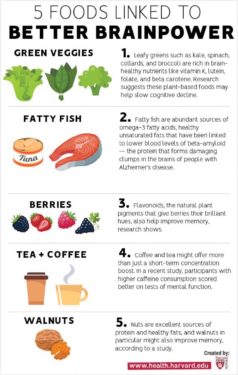By Mohammad Ahrar, PhD
Introduction
The human brain is larger than the brain of any other animal per body weight. The brain represents only 2% of total body weight but uses more than 20% of the body’s total energy. The brain also uses more energy than any other organ in the body. Billions of brain cells continually function without rest, even during sleep. Therefore, the brain needs a constant supply of oxygen and nutrients to function. In this article, we will discuss what the brain cells need to function properly and what foods meet those requirements.
Mystery of the brain
The average human brain is about 1,400 grams (with substantial individual variation). The brain continues to grow until it reaches its peak size at about 30 to 40 years of age. Human brains contain roughly 100 billion special cells called neurons and four times as many supportive cells called glial cells. Each neuron may have 10,000 connections to other neurons. Inside each neuron, hundreds of chemical reactions occur per second to control internal environment as well as diverse sensations to communicate with outside world.
Critical nutrients for the brain
Oxygen – All animals need oxygen to survive. Without oxygen, animal cells cannot function. Brain cells are most sensitive to oxygen level in blood and cannot survive more than a few minutes without oxygen. Therefore, the neurons must have a constant supply of oxygen, which is provided through breathing.
Energy – All cells of the body, including neurons, need energy to function. Without energy, no cells can survive. The energy that cells use is the chemical energy referred to as Adenosine Tri Phosphate (ATP).
Energy runs most chemical reactions in the cells. Energy is produced by metabolic reactions inside the cells using nutrients such as carbohydrates and fats.

Nutrients brain cells need to produce energy
1- Carbohydrates – The primary source of energy for brain cells is glucose. This simple sugar is a quick source of energy for all the cells of the body, but especially for brain cells. The typical human body has an available source of glucose in the form of glycogen for about one day’s energy needs when the body is in resting condition and does not do much physical activity. For marathon runners, the glycogen reserve may not last more than 15 minutes. The brain cannot store glucose. Therefore, it must have an uninterrupted and constant supply of glucose to provide energy for the nerve cells to function. Too much or too low blood glucose level is harmful to the brain. It is critical to maintain blood glucose in a normal range.
Research indicates that people whose blood sugar is on the high end of the “normal range” have a higher risk for brain shrinkage, which causes brain disorders and dementia. Other studies also show that even people without diabetes who had high blood sugar performed worse in memory tests and had a shrunken hippocampus (part of the brain involved in learning).
For information about carbohydrates please visit Peyk #163. (The Persian Cultural Center now has all its periodicals online. You can click on www.pccsd.org and choose the English version of Peyk.)
2- Fats and lipids – Fats are an integral part of brain cells. The cell membrane is mainly made of phospholipids, sphingolipids, and other types of fats, including cholesterol. Most neuron axons (the long extensions of brain cells) are covered by a fat-based molecule referred to as myelin, which is responsible for the fast nerve impulse transmission. Degeneration of the myelin sheath causes Multiple Sclerosis (MS) and other brain malfunctions. Although fats are essential nutrients for brain cells, the brain is very picky about the type of fats it needs.
Healthy fats for brain – The brain can use different types of fats and even fat metabolites, such as ketones, when necessary. Studies have shown that lipids that contain essential fatty acids, such as omega-3 fatty acids, are preferred fats for brain function. A decrease in the omega-3 fatty acid in the brain is associated with cognitive decline during aging and with onset of sporadic brain disorders. Additionally, according to Dr. Perlmutter (1), omega-3 fatty acid may activate the genes that produce new neurons in the hippocampus of the brain (the memory area), and not only improves the memory, but also can prevent Alzheimer’s disease.
Foods high in omega-3 fatty acids – Foods rich in omega-3 include fish oil, egg yolk (especially if the hen had access to pasture or was fed alfalfa), mother’s milk, and cold-water fish such as salmon, herring, mackerel, tuna, anchovies, and sardines. Omega-3 can also be derived from soybeans, nuts, and flaxseed.
Besides omega-3 fatty acid, foods that contain unsaturated fatty acids are conducive to brain health. Olive oil is rich in monounsaturated fats and has shown to improve overall cognitive function as well as verbal memory. For more information, please visit Peyk #159 and #160.
Other nutrients essential for brain function
Proteins – Proteins are components of the brain cell membrane. The enzymes inside the cells that run the chemical reactions and produce energy are proteins. Most neurotransmitters, such as serotonin and dopamine, are made of amino acids, which are subunits of proteins. The amino acid glutamate plays a crucial role in the rapid signaling between brain cells. Good quality proteins are good sources of essential amino acids that the brain cells need. Meat, poultry, fish, and eggs are excellent sources of good quality animal proteins. Beans, nuts, and seeds are also good sources of plant proteins. (For a further discussion about proteins, see Peyk #162.)
Vitamins – Vitamins are essential for healthy brain function. The B vitamins—especially folate and vitamins B12 and B6—play a major role in cellular metabolism and energy production in brain cells.
All vitamins are abundant in fruits and vegetables except vitamin B12, which is found in animal sources such as meat. (See Peyk #174 for more information.)
Vitamin C is known for its high antioxidant activity and its role in deactivation of free radicals and prevention of inflammation. So is vitamin E, which is a powerful antioxidant. Vitamin K is required for formation of sphingolipids, a form of fat in brain cell membranes.
Antioxidants – The brain is more sensitive to oxidative stress than any other organ of the body. Antioxidants play a major role in reducing cellular stress by deactivation of free radicals. Free radicals are unstable molecules that can disrupt and damage the normal chemical reactions in brain cells. Several studies have suggested that cellular damage caused by free radicals may be linked to a range of disorders including cardiovascular disease, certain cancers, Parkinson’s disease, and Alzheimer’s disease.
Consuming foods that have antioxidant properties can block harmful chemical reactions caused by oxidation, and prevent neurodegenerative disorders, such as Alzheimer’s disease. This is especially true with aging adults to have foods with antioxidant property in their daily diet.
Foods that boost brain function
To be upfront, no single food can work magic to prevent cognitive decline or prevent brain disorders or ensure a sharp brain as you age. Nutritionists agree that the most important strategy for a healthy brain is to follow a healthy dietary regimen. If we consider some foods to be brain-boosters, we should mention the foods that contain antioxidants, such as flavonoids and carotenoids, vitamin E, vitamin B group, and healthful fats—foods rich in these substances are known to support brain health, which could translate into better mental function. Research shows that the best brain foods are the same ones that protect your heart and blood vessels.
Sources of vitamins and antioxidant foods – Foods that contain vitamin C such as berries, broccoli, cauliflower, citrus fruits, tomatoes, and red or green peppers are good sources of antioxidants.
Eggs are a good source of vitamin B6, vitamin B12, and folic acid. Recent research suggests that these vitamins may prevent brain shrinkage and delay cognitive decline. Eggs from hens that had access to pasture are also rich in omega-3 fatty acids.
Broccoli contains vitamin C and flavonoids, which are rich in compounds that—when broken down in the body—produce isothiocyanates, which are potent antioxidants. Other cruciferous vegetables such as Brussels sprouts, cabbage, cauliflower, and kale are also rich in antioxidants.
Dark chocolate contains cocoa, also known as cacao, which itself contains flavonoids, a type of antioxidant.
Most berries also contain flavonoids, such as anthocyanin, which can reduce inflammation and oxidative stress.
Nuts such as walnuts, almonds, and hazelnuts contain omega-3 fatty acids, as well as vitamin E which have antioxidant properties and can protect cells from oxidative stress caused by free radicals. Pomegranate has antioxidant benefits which protect the brain from the damage of free radicals.
Foods that contain carotenoids, lutein, resveratrol, lycopene, and other phytochemicals—such as carrots, red grapes, tomatoes, and most berries—are also good sources of antioxidants.
Exercise for brain function
Many research institutions and health professionals suggest that the number one thing you can do to improve brain health is exercise. Results of studies show that exercise may activate certain genes in brain cells that control brain function, regardless of age. Each of the billion nerve cells can have 10,000 connections or synapses to other nerve cells. Those synapses can get stronger or weaker depending on how often we are exposed to new activities and mental challenges. The more we are exposed to an activity, even a simple sport, the stronger the connections will be. Any exercise that makes your heart beat faster, the more oxygen can increase blood flow to the brain and provide more oxygen to brain cell. (See Peyk #168 for more information.)
What foods can harm the brain?
Studies have shown that excess sugar, or sugary drinks, high fructose corn syrup. artificial sweeteners, such as aspartame, and processed white flour when eaten in excess, can adversely affect brain function and may result in brain fog.
Foods that contain saturated fats, and foods cooked in high temperature or in boiling oil, such as fried foods, can cause inflammation; therefore, they are not friendly to brain tissues. Oils that contain a high proportion of omega-6 fatty acids, such as soybean oil, can cause inflammation.
Alcohol, tobacco smoke, pesticides, heavy metals such as mercury, certain drugs, industrial solvents, and air pollutants are among the substances that produce most free radicals.
Summary
The brain needs a constant supply of oxygen and energy to function. The brain cells (neurons) are very sensitive to oxidative stress and harmful chemicals. Foods that contain antioxidants and omega-3 fatty acids are known to support brain health, which could translate into better mental function. The best brain foods are the same ones that protect the heart and blood vessels.
Selected References
1- Grain Brain, David Perlmutter, 2013, Little, Brown and Company, New York
2- https://www.health.harvard.edu/mind-and-mood/foods-linked-to-better-brainpower
3- https://www.hopkinsmedicine.org/health/wellness-and-prevention
4- https://www.webmd.com/diet/features/eat-smart-healthier-brain#1
5- The Brain Fog Fix, Mike Dow, MD, 2015, Hay House. Inc. Carlsbad, California
6- https://www.health.harvard.edu/mind-and-mood/foods-linked-to-better-brainpower
7- https://www.medicalnewstoday.com/articles/324044


















